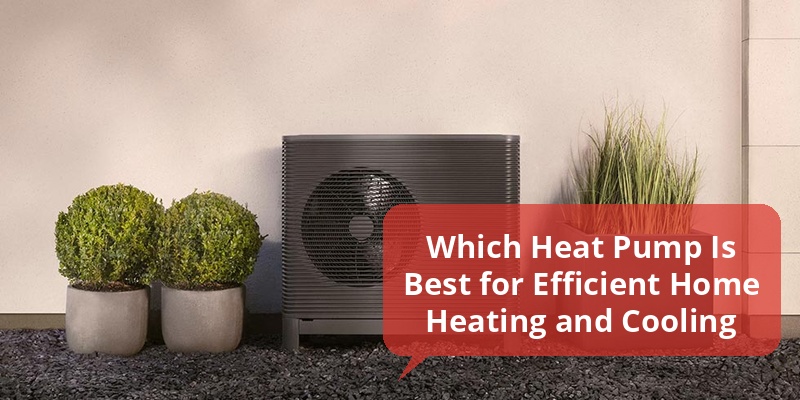Choosing the best heat pump for your home depends on several key factors including climate, energy efficiency, installation cost, and system type. Heat pumps are gaining popularity as they provide both heating and cooling solutions with eco-friendly operation and potential savings on energy bills. Understanding the types of heat pumps available and matching them to your home’s requirements will ensure optimal comfort and cost-effectiveness.
| Heat Pump Type | Best For | Pros | Cons |
|---|---|---|---|
| Air Source Heat Pump | Moderate Climates | Cost-effective, easy to install, efficient in mild weather | Performance drops in extremely cold weather |
| Ground Source (Geothermal) Heat Pump | All Climates, Long-Term Use | Extremely efficient, stable performance, low operating costs | High installation cost, requires space for ground loops |
| Water Source Heat Pump | Near Water Bodies | High efficiency, environmentally friendly | Requires access to water source, complex installation |
| Ductless Mini-Split Heat Pump | Homes Without Ductwork | Flexible installation, zoned heating and cooling | Higher upfront cost per unit, aesthetic impact |
Types of Heat Pumps and Their Ideal Applications
The best heat pump varies by type, each designed for different climates and home configurations. Understanding these types helps homeowners make informed decisions.
Air Source Heat Pumps
Air source heat pumps are the most common and work by transferring heat between your home and outside air. They operate efficiently in mild to moderate climates and are widely used for residential heating and cooling. Modern models are enhanced with cold climate technology enabling them to work better in lower temperatures but may still struggle in severe cold.
Ground Source (Geothermal) Heat Pumps
Geothermal heat pumps use underground loops to exchange heat with the earth, which remains relatively constant year-round. This makes them highly efficient for both heating and cooling across all climates. Despite their high upfront installation cost, they offer substantial long-term energy savings and durability.
Water Source Heat Pumps
These systems draw heat from nearby water sources such as lakes or wells, providing excellent efficiency. They are less common due to installation complexity and the necessity of a suitable water source. They offer environmentally friendly operation and stable heat exchange.
Ductless Mini-Split Heat Pumps
Ideal for homes without existing ductwork, mini-split systems provide zoned heating and cooling, allowing for personalized temperature control. They install easily and avoid energy losses common in duct systems but generally have a higher initial cost per zone.
Key Factors to Consider When Choosing the Best Heat Pump
Choosing the right heat pump involves balancing upfront costs, operational efficiency, climate suitability, and the physical layout of your home.
Climate Compatibility
The local climate is central to selecting a heat pump. Air source systems perform well in moderate climates but may require auxiliary heating in colder regions. Ground source heat pumps are versatile and efficient in various environments, performing consistently regardless of outdoor temperature variations.
Energy Efficiency Ratings
Look for units with high Seasonal Energy Efficiency Ratio (SEER) for cooling and Heating Seasonal Performance Factor (HSPF) for heating. Higher ratings translate into lower energy consumption and cost savings over the system’s lifespan.
Installation and Maintenance Costs
Geothermal systems have higher initial installation expenses due to ground loop requirements but typically cost less to operate and maintain. Air source heat pumps are usually more economical to install but can incur higher utility costs in extreme temperatures. Maintenance includes regular filter changes and system checks for optimal performance.
Energy Savings and Environmental Impact
Heat pumps significantly reduce greenhouse gas emissions compared to conventional heating systems by using electricity more efficiently and often incorporating renewable energy sources.
Reducing Utility Bills
Heat pumps consume less electricity to transfer heat than electric resistance heaters use to generate heat. In cooling mode, they also operate more efficiently than traditional air conditioners.
Environmental Benefits
Using heat pumps reduces dependence on fossil fuels, lowering carbon footprints. Incorporating renewable electricity sources such as solar panels further enhances their environmental advantages.
Popular Heat Pump Brands in the Market
When investing in a heat pump, brand reliability, warranty, and customer support are important considerations.
| Brand | Specialty | Notable Features | Price Range |
|---|---|---|---|
| Carrier | Air Source, Ductless | High efficiency models, advanced compressors | Mid to High |
| Trane | Air Source | Durable components, comprehensive warranties | Mid to High |
| WaterFurnace | Geothermal | Industry leader in geothermal systems, high efficiency | High |
| Mitsubishi Electric | Ductless Mini-Split | Quiet operation, advanced inverter technology | Mid to High |
| LG | Air Source, Ductless | Innovative design, energy efficient | Mid |
Installation Considerations and Professional Assessment
Professional installation is critical for heat pump performance and longevity. Proper sizing and placement tailored to your home ensure efficient operation.
- Load Calculation: An HVAC technician conducts a Manual J load calculation to determine the appropriate system capacity based on your home’s size, insulation, and climate.
- Ductwork Evaluation: Existing duct systems should be inspected for leaks or inefficiencies, especially if selecting a ducted heat pump solution.
- Site Assessment: Ground source heat pump installation requires land availability and soil testing for suitability.
Advancements in Heat Pump Technologies
Recent innovations include cold-climate air source heat pumps, variable speed compressors, and smart thermostats, which enhance system efficiency and user control.
Cold-Climate Heat Pumps
Designed to operate efficiently at temperatures as low as -15°F, these models reduce the need for supplementary heating in northern regions.
Variable-Speed Compressors
These compressors adjust output to maintain consistent indoor temperatures, improving comfort and efficiency while reducing wear.
Smart Controls
Integration with smart home systems allows remote monitoring and energy optimization based on user habits and weather forecasts.
